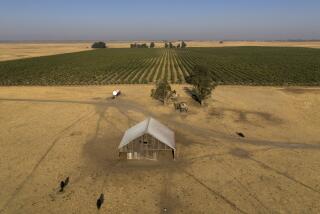Calabasas Is 2nd City to Oppose Soka Expansion : Development: In a long, often acrimonious session, the City Council heeds traffic and environmental concerns over the university plan.
After five hours of often contentious debate, the Calabasas City Council voted unanimously early Thursday morning to oppose expansion of neighboring Soka University.
Council members said it would cause gridlock in the west San Fernando Valley and destroy a serene meadow in the Santa Monica Mountains.
Calabasas is the second neighboring city to reject the school’s proposal to grow from 100 to 4,400 students. Malibu was the first. Because of suggestions and concerns raised by speakers at the Calabasas hearing, the resolution will be modified slightly and a final vote will be taken at the council’s Oct. 2 meeting.
Soka University is more than a mile outside city limits, so the council does not formally have a say in whether the Japan-based institution receives a necessary zone change from Los Angeles County. But county planning commissioners and supervisors tend to consider the opinions of surrounding cities.
“I think it’s important that Los Angeles County know from the get-go that we’re involved . . . and that we’re going to be looking over their shoulders,” Calabasas Councilwoman Lesley Devine said.
Devine and the other council members said the problem was not the university itself, but its location on 580 acres of rural land near Mulholland Highway and Las Virgenes Road.
“We would certainly support this university going in a more logical place--this is rural,” she said.
State and federal park officials, who want part of Soka’s property for their headquarters, and neighbors and environmentalists who fear the campus would destroy the serenity of the area heralded the council’s action as evidence of a growing movement against the expansion.
“We’ve got these two cities on our side,” said Les Hardie, president of the Las Virgenes Homeowners Federation. “We basically have Soka bracketed.”
Soka representatives who attended the meeting criticized the council for prejudging the project, which does not have its first public environmental review until mid-October.
“We’re looking at people making decisions based on a whole lot of unknowns,” Soka spokeswoman Bernetta Reade said.
The debate over Soka turned ugly many times during the hearing, which lasted until nearly 2 a.m. Residents fought with one another and with the council. Council members argued among themselves.
When local historian Juliana Gensley rose to speak in favor of the expansion, several opponents of the plan loudly accused her of accepting donations from Soka for her historical preservation projects. Gensley denied the charge.
When the environmental consultant hired by Soka, Joseph G. Johnson of Envicom, said the school’s administrators are “highly aware of nature” and would not “trash the environment,” homeowner representative Hardie accused him of bias.
“I have never seen an EIR by a private company that says the project of his boss should not be built,” he said.
And when Agoura resident Alexis Byfuglin, whose husband manages a business in Calabasas, said it was unfair for the council to make its decision before hearing public comments, Councilwoman Karyn Foley interrupted her.
“I’ve spent three months listening, reading and investigating,” Foley said. “Just because you disagree is no reason to critique me.”
Soka representatives tried unsuccessfully at the hearing to persuade the council to postpone a decision for at least two months. Reade said that despite the vote, Soka administrators hope that “the door for communication gets left open” between the council and the university.
More to Read
Sign up for Essential California
The most important California stories and recommendations in your inbox every morning.
You may occasionally receive promotional content from the Los Angeles Times.










